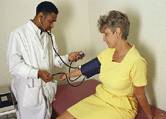- The Best Time of Day to Drink Bone Broth to Maximize Health Benefits
- 8 Ways to Increase Dopamine Naturally
- 7 Best Breads for Maintaining Stable Blood Sugar
- Gelatin vs. Collagen: Which is Best for Skin, Nails, and Joints?
- The Long-Term Effects of Daily Turmeric Supplements on Liver Health
- Could Your Grocery Store Meat Be Causing Recurring UTIs?
- Are You Making This Expensive Thermostat Error This Winter?
- Recognizing the Signs of Hypothyroidism
- 10 Strategies to Overcome Insomnia
- Could Artificial Sweeteners Be Aging the Brain Faster?
Doctors Really Do Raise Your Blood Pressure


Patients’ blood pressure readings are notably higher when they’re taken by a doctor than by a nurse, a new study finds.
This link between doctors and higher blood pressure readings is known as the “white coat effect,” and is believed to be the result of patients being more nervous when examined by a physician.
This effect has been noted in a number of previous studies, but this new paper is the first to confirm it, according to the study authors.
The investigators analyzed data from more than 1,000 people who had blood pressure readings taken by both doctors and nurses during the same visit. The readings taken by doctors were significantly higher than those taken by nurses, the study authors found.
The findings, published in the current issue of the British Journal of General Practice, should lead to changes in the way blood pressure readings are taken, according to lead author Dr. Christopher Clark, of the University of Exeter Medical School, in England.
“Doctors should continue to measure blood pressure as part of the assessment of an ill patient or a routine check-up, but not where clinical decisions on blood pressure treatment depend on the outcome,” Clark said in a university news release.
“The difference we noted is enough to tip some patients over the threshold for treatment for high blood pressure, and unnecessary medication can lead to unwanted side-effects,” he said.
“Some patients may be erroneously asked to continue to monitor their own blood pressure at home, which can build anxiety. These inappropriate measures could all be avoided by the simple measure of someone other than a doctor taking the blood pressure recording,” Clark added.
He suggested that researchers “should also think carefully about how to account for this effect in studies that compare treatment by doctors and nurses. Some studies have concluded that nurses are better at treating [high blood pressure], when in fact those findings could be down to this recording bias.”
More information
The U.S. National Heart, Lung, and Blood Institute explains how to prevent high blood pressure.
Source: HealthDay
Copyright © 2026 HealthDay. All rights reserved.










